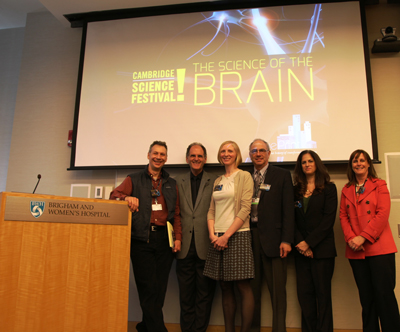To
NASA and Beyond: BWH Researchers Share the Wonders of Neuroscience at Cambridge
Science Festival
 |
| Speakers (L to R): James Cartreine, PhD; Martin Samuels, MD; Laura Holsen, PhD; Howard Weiner, MD; Emily Stern, MD; Page Pennell, MD. |
For
the first time, BWH joined the festivities of the annual Cambridge Science
Festival, a 10-day celebration of science, technology, engineering and math held
throughout Boston and Cambridge. As part of the festival and the ongoing BWH
Blueprint celebration, the BWH Biomedical Research Institute organized a
session on April 16 featuring experts in neurology and psychiatry. Attendees
from the public and BWH filled the Shapiro Breakout Room and Shapiro Boardroom,
excited to learn about the latest in neuroscience research.
BWH speakers covered various topics ranging
from the pros and cons of taking anti-epilepsy drugs during pregnancy to diagnosing
mental disorders in the 21st century.
"I want to share how important the
brain is in the functioning of the whole body," said Martin Samuels, MD,
chairman of BWH's Department of Neurology, who discussed how interactions
between the brain and heart may produce a characteristic form of heart damage
that causes heart cells to perish. "The brain is in charge of everything. We
are who we are because of our brains."
James Cartreine, PhD, BWH Department
of Psychiatry, later took the audience somewhere they likely had never traveled
before: outer space. When NASA noticed
depression in astronauts, Cartreine wanted to help address the issue. He knew that
depression could be treated with medications and psychotherapy, but a question
he asked himself was, "Could software treat depression?"
Cartreine spoke about a collection of interactive software programs he developed that
help astronauts deal with psychosocial problems that may occur while in space.
One of his programs, electronic problem-solving treatment, or ePST, is also
being rolled out to the public to help improve mood and enjoyment of life in
patients with depression.
Howard Weiner, MD, of BWH's Center for
Neurological Diseases, closed the event with a talk that introduced a new perspective
on microglial cells-immune cells in the brain and spinal cord that help protect
the brain. Weiner's research shows that the absence of these cells may be an
indicator for various diseases, such as multiple sclerosis and amyotrophic
lateral sclerosis, or Lou Gehrig's disease, which is characterized by loss of
muscle movement control.